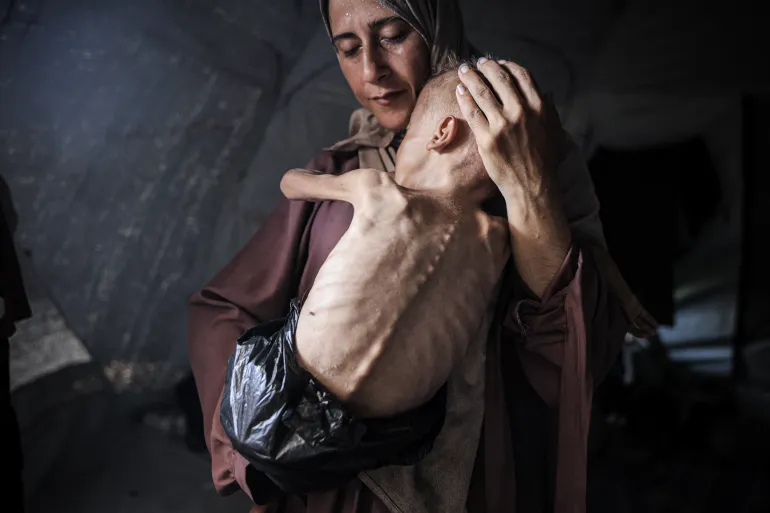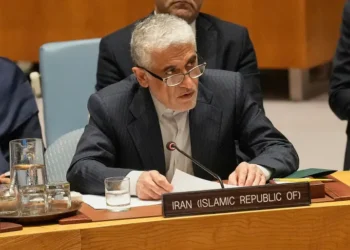The UN-backed Integrated Food Security Phase Classification (IPC) has confirmed famine in Gaza.
The UN classification system for monitoring world hunger and food security has raised its classification to Phase 5, the highest and worst level of its acute food insecurity scale.
It said that famine is confirmed in the Gaza Governorate, which includes Gaza City and its surrounding area, with “catastrophic conditions” projected to expand to Deir al-Balah and Khan Younis by the end of September.
At this point, more than 500,000 people throughout Gaza are living under Phase 5 conditions, the IPC report said. Another 1.07 million people, or 54 percent of Gaza’s population, are classified as being under Phase 4, or “emergency” conditions, while 396,000 people (20 percent) are under Phase 3, or “crisis” conditions.
It comes as Israeli Prime Minister, Benjamin Netanyahu says his cabinet has approved plans for a new assault on Gaza City. The Israeli army has warned medical workers and international organisations to prepare for the planned evacuation of the city’s one million residents to shelters in the south.
The IPC report projected that malnutrition threatens the lives of “132,000 children under five” in Gaza until June next year, assessing they are expected to suffer “acute malnutrition.”

It added that 41,000 of these cases will experience “severe” malnutrition, double the number estimated in the IPC’s May assessment, putting them at “heightened risk of death.”
According to the IPC report, “large segments” of Gaza’s population were consuming diets “that fall extremely short in both nutritional quantity and quality.”
“Nutrition supplies for treating and preventing acute malnutrition are close to depletion due to entry restrictions, which may force health facilities to halt treatment.”
IPC report
Meanwhile, it added that nearly 55,500 malnourished pregnant and breastfeeding women will require urgent nutrition response.
Also, the IPC said that it has been unable to fully assess the famine situation in two of the Gaza Strip’s five governorates. The report noted that the “severity of conditions” in North Gaza has been found to be “similar or worse than in Gaza Governorate”, but that “limited evidence” means the IPC recommended not to classify the area as the data is insufficient to meet its thresholds. “Urgent steps should be taken to allow for a full humanitarian assessment in this governorate,” the IPC stated.
Additionally, the IPC said that it chose not to analyse the Rafah area as evidence indicated that the area in the Strip’s south is “largely depopulated” but the report emphasises that anyone left living there is of “high concern,” given the Israel’s extensive “evacuation and military zones and no access to services or assistance in this area.”
Moreover, the IPC report stressed that the famine in Gaza is “entirely man-made,” adding that it can be “halted and reversed.” “The time for debate and hesitation has passed, starvation is present and is rapidly spreading,” the report stated.
The report added that there should be “no doubt in anyone’s mind that an immediate, at-scale response is needed.” “Any further delay—even by days—will result in a totally unacceptable escalation of famine-related mortality,” it added.
Israel Rejects IPC report Of Famine In Gaza
Israel’s Foreign Ministry rejected the findings of a UN-backed food security report, saying that there was no famine in Gaza.
It slammed the document, saying that it was “based on Hamas lies laundered through organisations with vested interests.”
Response from Israel’s Coordination of Government Activities in the Territories (COGAT), the military body in charge of aid, stated that the IPC report is “false and relies on partial, biased data and superficial information originating from Hamas, a terrorist organisation.”
It called the IPC’s evaluation one-sided and that it disregards the “extensive humanitarian efforts undertaken in Gaza.”
COGAT also claimed that the IPC report is based on “questionable methodology,” saying that the IPC’s famine classification rests on an “unpublished phone survey and questionable assessments by UNRWA, a UN agency known for its workers being an integral part of Hamas, and local NGOs, while speculating wildly about mortality rates that even Hamas’s own Health Ministry does not report” which undermines its credibility.
COGAT also accused the IPC of failing to take into account Israel’s measures to stabilise the situation and the significant humanitarian efforts.
It said that there is a “consistent Israeli policy to facilitate humanitarian assistance to Gaza’s civilian population” and that will continue “in full accordance with international law.”
READ ALSO: Binduri MP Confident in IGP’s Akwatia Plans, Calls for Military Fleet Renewal





















